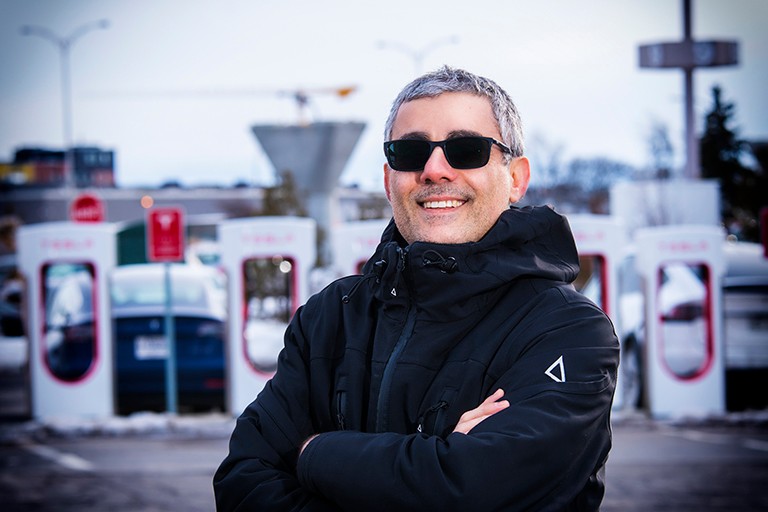Canada Foundation for Innovation funds a Concordia-led research project developing resilient smart cities

How can we rethink Quebec’s electrical grid to accommodate the growing popularity of electrical vehicles while making sure it is secure and scalable?
That is among the challenges Chadi Assi, professor at Concordia’s Gina Cody School of Engineering and Computer Science, is ready to tackle through a research project recently funded by the Canada Foundation for Innovation (CFI).
Assi's project is part of more than $518 million in funding support to infrastructure needs of universities and research institutions across the country that were announced today by the Prime Minister of Canada Justin Trudeau and François-Philippe Champagne, minister of innovation, science and industry.
CFI supports institutions and their researchers in building on established capabilities to accelerate current research and technology development, or to enhance emerging strategic priority areas.
Toward Intelligent and Resilient Smart Cities with Energy-Vehicle-Human Interactions, the project Assi is leading, has attracted $1.8 million in total funding and is gearing up to launch interdisciplinary labs in summer 2021.
Assi is a professor with the Concordia Institute for Information Systems Engineering and a Tier I Concordia University Research Chair in Advanced Internet Technologies. He is also a member of the Concordia Security Research Centre.
“We will build a safe, secure and resilient network that will allow Internet of Things (IoT)–connected smart cities to thrive and grow,” Assi says. “I will lead a team of 10 faculty to create prototypes of scalable infrastructures in three key areas of research.”
 Chadi Assi: “We will build a safe, secure and resilient network that will allow Internet of Things–connected smart cities to thrive and grow.”
Chadi Assi: “We will build a safe, secure and resilient network that will allow Internet of Things–connected smart cities to thrive and grow.”
3 research areas to help make smart cities a reality
- Develop a reliable energy system that empowers mobility, connectivity and sustainability of smart cities in all conditions. The lab will house a prototype of a power grid that is resilient, secure and reliable as well as supportive of electric vehicle integration, as Quebec moves to shift to electric vehicles by 2035.
- Secure control of intelligent transportation systems. The goal is to create a networked infrastructure for autonomous wireless systems. Drones, electric vehicles and traffic lights could talk to each other seamlessly with minimal human intervention over a secured network.
- Human-machine interfacing within human-in-the-loop cyberphysical system. Imagine driving your autonomous electric vehicle — remotely.
Securing a greener future
“Our mission is to train the next generation of engineering and computer science leaders advancing emerging technologies in a socially responsible manner,” says Mourad Debbabi, interim dean at the Gina Cody School.
“We bring together engineers with expertise in smart cities, power, protection, control and communication, as well as cybersecurity and artificial intelligence researchers to create real-life and scalable models of smart cities, smart grids and transportation systems. We are then on track to reason about the security of these systems.”
Concordia is outfitting labs with state-of-the-art equipment to house the prototypes on the Sir George Williams Campus.
In addition, four other inter-institutional projects supported by Concordia University were successful in the competition:
- Rolf Wuthrich, Wenfang Xie, Masoumeh Kazemi Zanjani and Tsz Ho Kwok, professors in the Department of Mechanical, Industrial and Aerospace Engineering (MIAE) at the Gina Cody School, are partnering with other Quebec university faculty members in a project lead by École de technologie supérieure to establish infrastructure for the “Intelligent Cyber Value Chain Network (CĒOS Net).”
- Virginia Penhune and Karen Li, professors in the Department of Psychology in the Faculty of Arts and Science, will collaborate with Université de Montréal and McGill University on the “Auditory-Motor Skill Learning and Brain Plasticity” project.
- Glenn Cowan, professor in the Department of Electrical and Computer Engineering at the Gina Cody School, participates in a research project lead by Université de Sherbrooke on the “Distributed Digital Intelligence Network (D2IN): Development of disruptive and low-cost microsystems for edge computing.”
- Christian Moreau and Ali Dolatabadi, MIAE professors at the Gina Cody School, will work with McGill University on the “Advanced Cold Spray Additive Manufacturing Facility” project.
“We are thrilled that Concordia’s commitment to research that supports government and industry goals will be sustained,” says Paula Wood-Adams, interim vice-president of research and graduate studies. “This latest funding will help Concordia generate more funding opportunities for our researchers and create world-class experiential learning spaces for our students.”
The project has received additional funding from the Québec Ministère de l’Économie et de l’Innovation and Concordia.
Learn more about the Concordia Institute for Information Systems Engineering and the Gina Cody School of Engineering and Computer Science.


